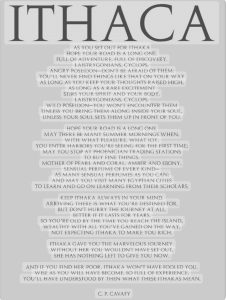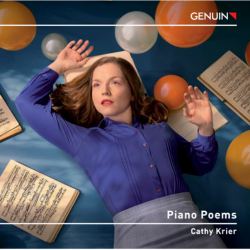Ithaca
op. 104, 2023
For piano
Duration: 8 min.
Composition commissioned by Philharmonie Luxembourg
CD recording in Philharmonie Luxembourg, for the Label Genuin Classics, November 2023, Soloist Cathy Krier
World premiere on 6. Mai 2024, Philharmonie Luxembourg
Soloist: Cathy Krier
Composer’s Notes
Ithaca was commissioned by the Philharmonie Luxembourg to write a composition for the pianist Cathy Krier, to whom the piece is dedicated. The inspiration for this composition came about as part of Cathy Krier’s project “piano poems”.
The poem Ithaca by the Greek poet Konstantinos Kavafis inspired me to write the composition of the same name for this project. Kavafis describes the journey to Ithaca as a journey of different experiences about oneself. He metaphorically thematizes the ten-year journey of Odysseus, who left Ithaca for the Trojan War and finally returns to his home island after many adventures.
Kavafis wishes in this poem the journey to be a long one, full of adventure, difficulties, and surprises. To overcome these, one should keep the goal of arriving in Ithaca above all else, without any inner doubts. This is the only way to view the journey as an advantage and gain the strength to continue it again and again. When you have grown old and arrived on Ithaca, you will feel the wealth of experience you have gained in your search for the path.
For me, the poem radiates – despite the many encounters one has in life – a calmness and an inner security that gives strength for a conscious life: never forget the goal. These thoughts were the starting point for the dramaturgy of my composition.

The piece consists of three parts that are played in a flowing sequence. My wish was to create the different timbres, miniatures, and the melody at the end together in the spirit of the path.
The first part represents the beginning of the journey. The strings in the grand piano are stimulated to sound by superballs, singing bowls and gemstones. This creates adventurous fascinating sounds based on a variety of resonances and timbres.
The second part is the journey itself: it consists of several short pieces and is played traditionally on the keyboard. The compositional idea of writing miniatures as small parts of a longer phrase is central to this part. The connections between these parts are created by the often-changing rhythms and by the specific times at which the right pedal is changed.
In the third part, a melody is repeated in the left hand as if in a ritual, referring to the arrival at Ithaca. The right hand accompanies as if narrating the reflection on the journey in the peace and security of the arrival.

